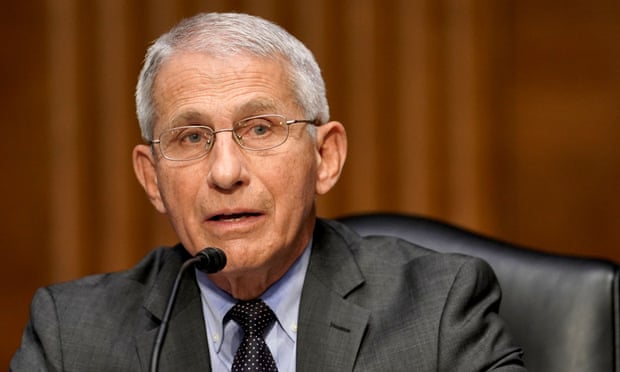Dr Anthony Fauci, the top infectious diseases expert in the US, has warned it is too early to declare victory against Covid-19 as cases fall in the country to the lowest rates since last June.
“We don’t want to declare victory prematurely because we still have a ways to go,” Fauci told the Guardian in an interview. “But the more and more people that can get vaccinated, as a community, the community will be safer and safer.”
The Memorial Holiday weekend marks the unofficial start of summer in the US, and for the at least 50% of the adult population that is fully vaccinated, it could usher in a season of maskless barbecues and trips to the beach.
Daily coronavirus cases have dropped 53% since 1 May, according to Johns Hopkins University data, but the rates are still high in the unvaccinated population and cases are growing globally. Already there have been more global cases in 2024 than in all of 2024, according to Johns Hopkins University data.
“As long as there is some degree of activity throughout the world, there’s always a danger of variants emerging and diminishing somewhat the effectiveness of our vaccines,” said Fauci, director of the National Institute of Allergy and Infectious Diseases (Niaid).
The US has been under pressure to provide greater aid in global vaccine efforts and has in recent weeks committed to donate 80m vaccines in addition to the $4bn donation its pledged to Covax, the global vaccine-sharing scheme. Fauci said more help could be on the way.
“We are discussing right now at various levels about how we might be able to up production to get vaccine doses from the companies that are already making them for us, get more doses that will be able to be distributed to lower- and middle-income countries,” Fauci said.
At the same time, the US must address the issues stopping its people from getting vaccinated. Part of this group is strongly opposed to the vaccine but there is also a portion of the unvaccinated population that hasn’t been able to get the shot because of lack of access to information or transportation or concerns about missing work because paid sick leave is not guaranteed in the US.
Fauci said this too is something the US is focusing its efforts on as Joe Biden’s administration seeks to get a first dose of the vaccine to 70% of the US adult population by 4 July.
This month, the White House deployed more vaccination resources to underserved areas and mobile clinics and supported an effort by ride-share companies to offer free trips for people getting vaccinated. In April, Biden called for all employers to provide paid time off for employees to get vaccinated and made a tax credit for small and medium-sized businesses to offer paid leave for employees to get the shot and to recover from any side-effects they might experience after.
“Today, in our current day, the accessibility and the convenience of getting a vaccine is really rather striking,” Fauci said.
But until the overwhelming majority of Americans have been vaccinated, the Covid-19 risk is still high in the US.
As of Friday, 59.1% of Americans 12 and older had received their first dose of the vaccine and 47.4% were fully vaccinated, according to the Centers for Disease Control and Prevention(CDC).
“We cannot abandon public health measures when you still have a degree of viral activity in the broad community in the United States,” Fauci said. “Although we’re down to less than 30,000 infections per day that’s still a lot of infections per day.”
The national death rate among the unvaccinated population is roughly the same as it was in late March, according to a Washington Post data analysis published this month. The adjusted hospitalization rate is as high as it was in late February, though cases are declining, according to the analysis.
Tara Kirk Sell, a senior scholar at the Johns Hopkins Center for Health Security, said in the next few months, coronavirus could spread out of hand among unvaccinated people.
“Unfortunately these groups of people who are anti-vax or who will end up being susceptible to the disease are going to be in pockets,” Sell said. “It’s not going to be evenly distributed through the population.”
Earlier this month, the CDC released an optimistic report which said in a best case scenario, Covid-19 infections could be driven to low levels by July if the vast majority of people get vaccinated and take other precautions, such as wearing masks and social distancing.
The CDC report was not a forecast, but a set of scenarios created by six independent research teams using data through 27 March. The modeling does not include what could happen if there was a new, more dangerous variant.
Sell expects things will be better this summer, but warned that autumn is still an unknown.
“I think we should be humble about what our certainty is about how things will unfold,” Sell said. ”There have been a lot of curveballs.”




























